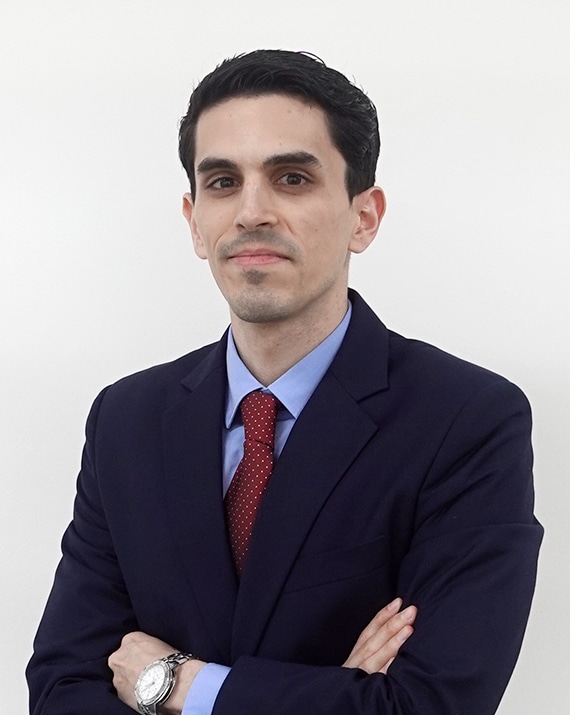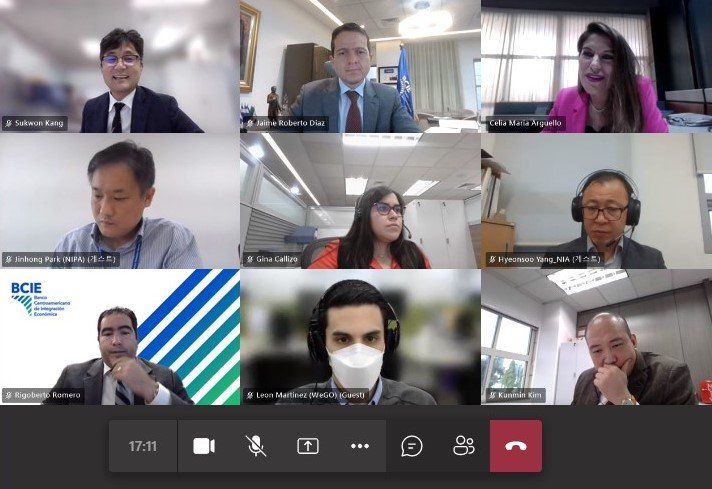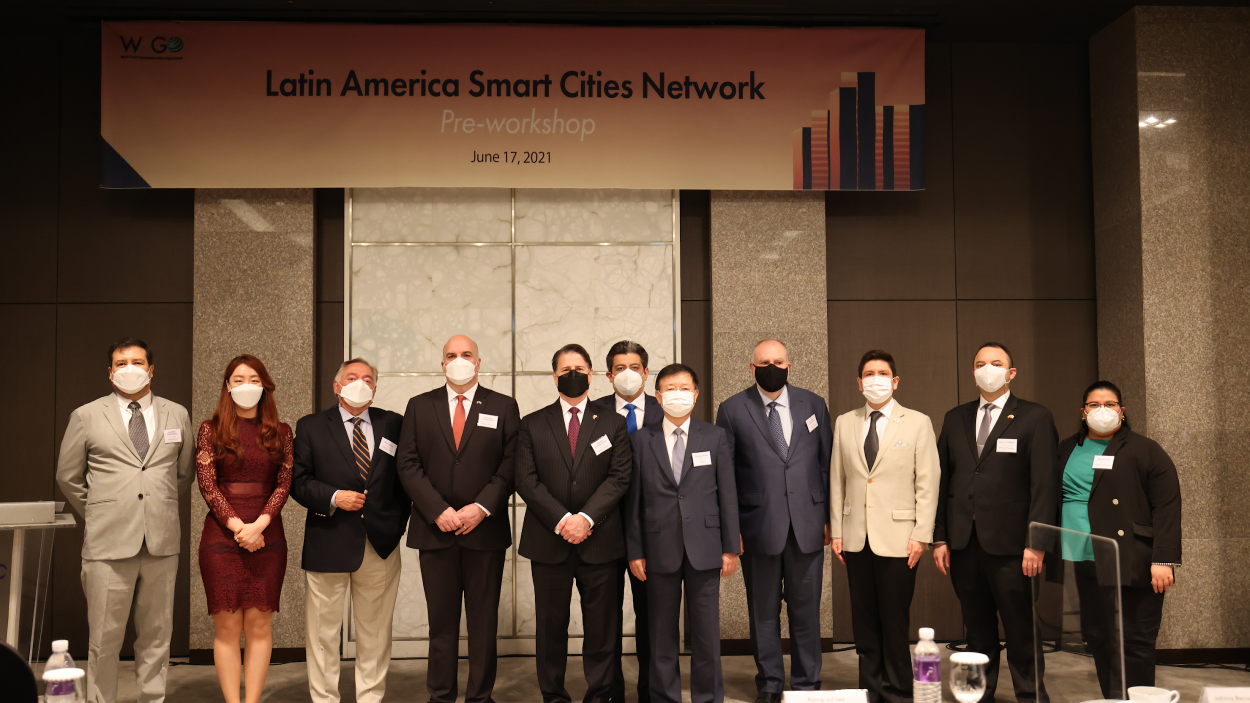
[Story Telling for SDG Implementation] Leon Martinez (MPP 2019)
- Date 2022-09-14 10:39
- CategoryStory
- Hit963
NB: This interview is part of the series, ‘Story Telling for SDG Implementation: Case Studies from Around the World.’ It is a KDIS Alumni Working Partner Program initiative run by Ms. Cynthia Mbabazi (MPP 2019) and Mr. Socrates Luseka (MDP 2019).
By sharing stories of notable KDI School Alumni involved in various SDG implementing initiatives, they hope to inspire other KDIS community members to implement SDGs in their own areas of practice.

Mr. Leon Martinez is a Program Officer at the World Smart Sustainable Cities Organization (WeGO) in Seoul, South Korea. The World Smart Sustainable Cities Organization (WeGO), established by 50 founding members in 2010, is an international association of city and local governments, smart tech solution providers, and national and regional institutions committed to the transformation of cities into smart sustainable cities through facilitating public-private partnerships (PPP). WeGO has more than 200 members around the world and its secretariat serves as their international platform to improve the quality of life, innovate in the delivery of public services, and strengthen regional competitiveness.
As a Program Officer, Leon oversees the Latin America Smart Cities Network (LASCN), as well as partnership management with other institutions. He met with Cynthia (MPP 2019) and Socrates (MDP 2019), and shared his experience.
What drew you into working for the World Sustainable Smart Cities Organization?

That is a good question. A number of things drew me to working for WeGO. First of all, a lot of it had to do with my studies at KDI School. Given my background, I majored in business administration and did not primarily aim to work at an international organization, let alone in the sustainable development and smart cities field. However, after studying at KDIS, I was very much compelled to learn how cities could improve by borrowing knowledge from other best practices. A lot of what I learnt at KDIS was connected to sustainable development and smart cities, and that definitely stirred my interest.
Secondly, it was technology. I have always been passionate about technology and its ability to make people’s lives easier. I remember the first time I chanced on WeGO and learnt of its focus on smart cities, I was very much interested in understanding the practicality of building smart cities, the technologies available and how they could be harnessed to improve our lives.
I’d say that those are some of the key factors that nudged me into joining WeGO. The interest to use technology to improve people’s lives was very much alive, especially at the beginning of the pandemic when I had just finished graduate school.
You assumed your role a few months after graduating from KDI School. How do you think KDI School groomed you and positioned you for your current role?

There are two aspects to this. First, there is the technical aspect, which involves the training on policy making, with knowledge sharing being a key approach. The idea of knowledge sharing from other countries and the adoption of best practices was largely exercised at KDIS through assignments and discussions. At WeGO, we share multiple experiences as well, especially Seoul practices, and as such I’m able to lift the invaluable experience I had at KDIS into our work.
Another very important aspect I would say is networking. At KDIS, I was able to meet professionals from different walks of life, most of whom continue to be important in my career and life. I must say, I occasionally work with the KDIS Alumni, especially when organizing events. KDI School was that important networking platform that connected me to the right people in different sectors and different countries.
In order to meet the goal of transforming cities into smart sustainable cities, what kind of activities does WeGO initiate and implement in a given year?
At WeGO, we mainly act as a platform where all our members can exchange knowledge and connect with solution providers or other institutions in order to achieve their smart city development goals, as well as seeking cooperation areas together.
In line with our goals, we have six main groups of activities meant to help us meet/achieve our goals of sustainability and smart city development.
The first block is project implementation and matchmaking. Here, we support cities in their project implementation phases through matchmaking, feasibility studies and pilot projects. We organize workshops and webinars to matchmake local governments with tech solution providers. In a nutshell, during the workshops cities present their challenges or needs in a specific time under a given sector, and then solution providers present available technology in that same area.
The second block is capacity building. Every year WeGO organizes various training programs, which provide the opportunity of learning some of the newest and best practices in the field of smart city development.
The third is Research and development. Under this area, we are currently developing a smart city index. The purpose of having an index is to provide the cities in the organization with a reference for comparison with other cities on specific smart city aspects.
Fourth on our blocks is the knowledge-sharing activity. We organize conferences, webinars and any kind of forums that would allow our members to share best practices and experiences. The forums are a good platform for cities to share and learn the kind of technologies and developments that are available at the moment.
Fifth on the blocks are the regional activities, for example the Latin America Smart Cities Network (LASCN), that I am currently in charge of. The purpose of these regional networks is to adapt all the activities that we do to the specific needs of a region. We have the Africa Smart Cities Network as well and work with other networks like the ASEAN Smart Cities Network and China-Japan-Korea network.
Lastly, we hold our governance meetings (The Executive Committee and the General Assembly) where we invite Mayors, CIOs, and city officials from all the city members to share the agenda of the organization for the coming year and discuss specific issues depending on the theme of the event.
As a Project Officer, Latin America Smart Cities Network, what does your role and responsibilities entail?

I am currently in charge of the Latin America Smart Cities Network and also involved with other networks such as the Africa Smart Cities Network. The main purpose of the networks is to adopt the activities that we do to specific regions because there’s very different development levels and specific characteristics depending on the regions. Programs and activities that might work for some cities might be quite different for others. For the Latin America Smart Cities Network, we saw that language and culture are important factors. Thus, we organize specific webinars and conferences in Spanish and provide interpretation to other languages.
One of my major roles at the moment is identifying the areas of interest that the different cities might have. We do that through surveys and live sessions during events. Another important task is staying in communication with the cities and understanding their needs and challenges. I stay in constant communication with the cities in my network to understand the kind of projects that they are developing and the kind of challenges that they have, in order to organize events and activities for their benefit. We work very closely with embassies in South Korea and therefore I have kept close relationships with many of the Latin American embassies in order to understand what kind of needs they do have at a country or cities level.
What nature of challenges do you tend to encounter and in extension your organization, as you get down to meeting the different organizational mandates and goals? And how do you usually respond to these challenges?
One of the main challenges I observe is the differences in development that cities have. Many times, when people are talking about smart cities, they tend to only think about technology; however, implementing the latest technologies requires some basic infrastructure in place like electricity and communication systems, which some cities lack. To give a specific example, a couple of months ago we organized a webinar on smart tourism and had some tech solution providers presenting innovative technologies like 3D scanning and metaverse. All of them were very amazing and a couple are currently being implemented in Seoul. On the contrary, some cities in other regions lack the very basic technology to implement these advanced technologies, therefore, making a step-by-step approach necessary before being able to implement these more advanced technologies.
Another challenge is the language barrier. Sometimes when our language of delivery is in English-or another language for that matter, and the event at hand is tailored to say, a certain region -like Latin-America, some people might have difficulties in listening, comprehending and communicating in that language. So, we always try to provide interpretation or direct communication with the cities in the languages that they can speak. Having a very international staff at WeGO with people from different countries and backgrounds has helped. Language can limit access to information so I believe that it is very important for cities to be able to access information in their languages.
SDG no. 11 focuses on making cities and human settlement inclusive, safe, resilient and sustainable. Looking at what your organization is doing, would you say WeGO has contributed to implementation of this SDG (directly or directly)? How?

Yes, both directly and indirectly. Firstly, we conduct capacity building activities that I mentioned earlier, and these have a direct impact on how cities are developed sustainably. Our training incorporates the policy makers responsible for designing city plans and policies. Additionally, the youth programs like the WeGO Smart City Champions that we’ve been developing bear an indirect impact to SDG 11 as it teaches the young generation and the future leaders how to create more inclusive, safer, solid and sustainable cities.
Secondly, our project implementation and match making activities have a very strong focus on promoting private-public partnerships. In this sense, connecting cities with specific solution providers has a direct impact on the implementation of SDG 11.
Lastly, our feasibility studies also contribute to SDG 11. WeGO has carried out various feasibility studies and pilot projects in the past 10 years among member cities. These projects have very tangible benefits for the recipient cities, providing knowledge and hands-on experience on specific technologies that have a direct impact on the achievement of SDG 11.
One way or another, all the activities that we are doing have an impact on smart city development, and that is totally in line with achieving SDG 11.
Finally, any word of encouragement to the different members of the KDI School family that are consciously positioning themselves into areas that would see them contribute to the implementation of SDGs, either directly or indirectly?
KDIS is quite the ideal place if you want to arm yourself with all the necessary tools that would help you implement SDGs in whichever development space that you might find yourself in.
Networking is very important. KDI School is a great opportunity to meet new people from different cultures, different backgrounds, and different experiences; and that is so enriching. Enjoy the time you have there, meet as many people as you can and learn as much as you can from them, because you might need that in the future.
For instance, you might be working on a project that involves a specific city and say you had a friend that works for or worked for that city’s government. Their help can come in handy, aiding you to understand the city’s structure, needs or challenges. In short, having the opportunity to meet people from different countries and cultures is a great way of enriching your professional network, and therefore an invaluable tool.
